Manos Áureas. Die Hände der Hebamme als Schlüssel zu menschlicher Soziabilität im Spanien des Goldenen Zeitalters
IFK Online-Votrag
Datum: 14. Dezember 2020
Uhrzeit: 18:15 Uhr
Vortragende: Sabrina Grohsebner (Universität Wien)
Das Mitwirken von helfenden Händen am Geburtsprozess legt seit jeher das Fundament für menschliche Zusammenarbeit und Geselligkeit. Die Arbeit der Hebamme im Spanien des Siglo de Oro kann somit als gemeinschaftsstiftende und kulturprägende Tätigkeit verstanden werden. Diese wird jedoch durch ihren epochenspezifischen Grenzgang zwischen Leben und Tod, privater und öffentlicher Sphäre sowie Submission und Autorität geprägt. Wann mündet Kooperation in Konfrontation?
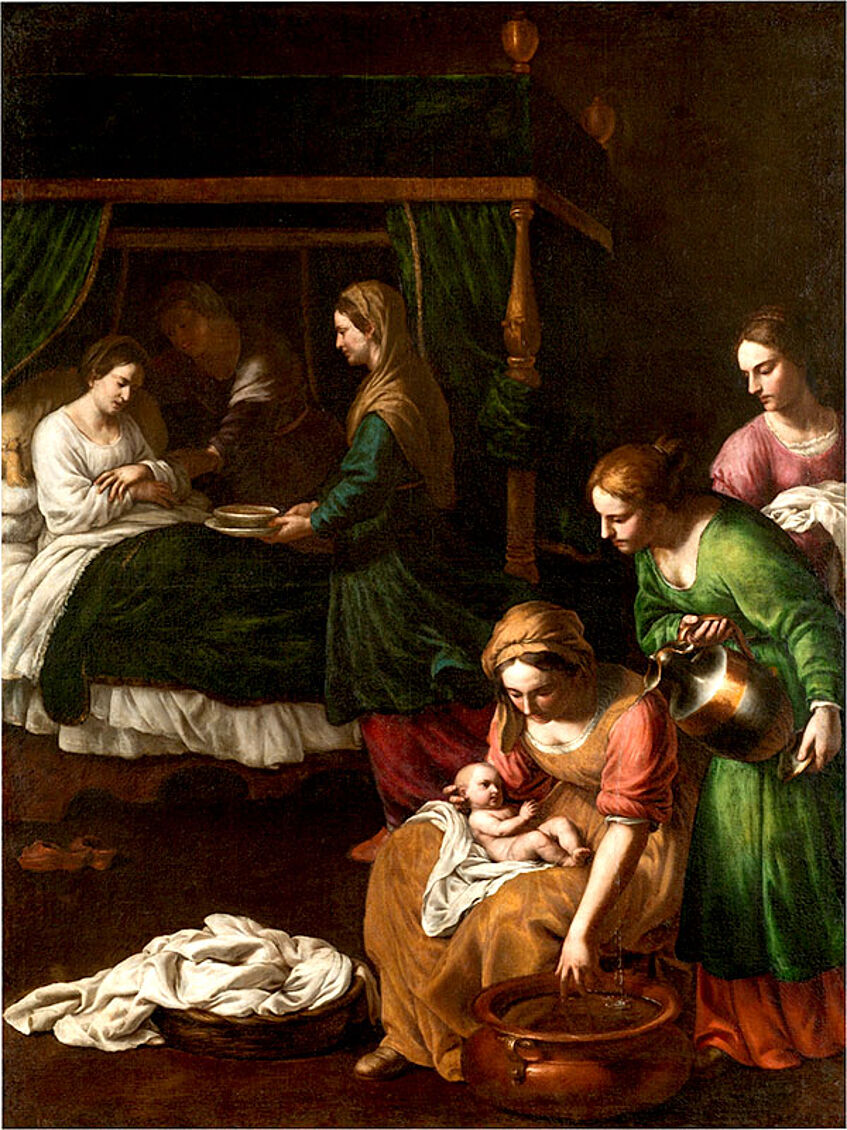
Alessandro Turchi: El Nacimiento de la Virgen, 1631 - 1635, Museo del Prado.
XII Congreso Asociación Internacional Siglo de Oro
Université de Neuchâtel
2th – 6th November 2020
We are participating in the congress with the following lectures:
Panel I: Fertilidad, Concepción y parto en el Siglo de Oro
- Hannah Fischer-Monzón: La Luna y sus tres caras. Tiempos y ritmos femeninos en el Siglo de Oro
- Simon Kroll: ¿Qué pasa en el útero? Teorías de concepción en la ciencia barroca
- Wolfram Aichinger: Partos nocturnos. La importancia obstétrica y cultura de la hora
Panel II: El Parto en la Cultura del Siglo de Oro. Asistencia y Testimonios femeninos
- Marie Christin Radinger: La autoridad en la sombra. Abuelas en los partos del Siglo de Oro
- Sabrina Grohsebner: Clamores y silencios: la involucración de comadres en partos secretos y parentescos manipulados durante el Siglo de Oro
- Alice-Viktoria Dulmovits: Sin las manos expertas - El parto sin comadre en fuentes escritas
Panel III: Embarazo, Puerperio y Lactancia en el Siglo de Oro. Aspectos sociales y jurídicos
- Nina Kremmel: Relaciones sexuales durante el embarazo y el puerperio en la España de la Temprana Edad Moderna
- Clara Bonet Ponce: La vida (antes de la vida) de don Gregorio Guadaña y otros personajes
- Marie-Louise Fürnsinn: Parentesco de leche en el teatro y la cultura del Siglo de Oro
Zwischen Suppentopf und Marienbild. Geburt im Spanien des 17. Jahrhunderts
VHS Urania Vienna
Datum: Donnerstag, 15. Oktober 2020
Uhrzeit: 18:00-19:30
Vortragender: Wolfram Aichinger (Universität Wien)
Was wissen wir über Geburt im 17. Jahrhundert? Wer war daran vor dem Zeitalter des Spitals beteiligt? Waren gebärende Frauen Opfer von ignoranten Hebammen und Kurpfuschern? Welche Rolle spielten religiöse Bilder und Symbole? Der Vortrag stellt Klischees in Frage und präsentiert neue Perspektiven.
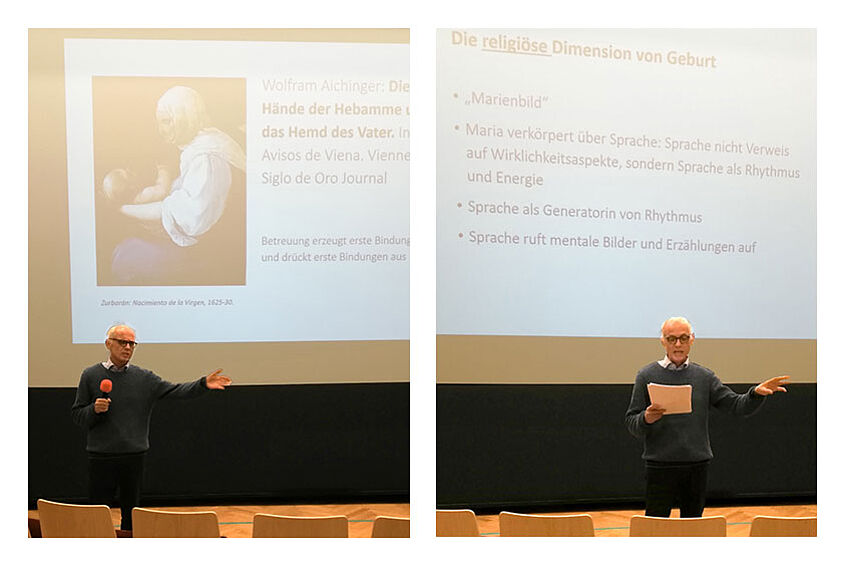
Justicia y parentescos manipulados en el teatro áureo
VI Jornadas Internacionales de Teatro del Siglo de Oro Español y Novohispano.
Dramaturgia y teatralidad: la justicia en el teatro áureo
Speaker: Alice-Viktoria Dulmovits (University of Vienna)
Thursday, 8th OCtober 2020
10am – 3pm
In her presentation, Alice-Viktoria Dulmovits attempted a parallel reading of theatrical works and legal texts in order to show how elements that worried jurisconsults, such as the duration of pregnancy, the place of birth or possible accomplices, can also be found in theatre plays that experimented with various scenarios of manipulated kinship and with different conceptions of justice (restauration of natural order, punishment etc.). The studied plays were, among others, El palacio confuso (Lope de Vega), La mentirosa verdad (Juan de Villegas), La ofensa y la venganza en el retrato (Juan Antonio de Mójica) and Las tres justicias en una (Pedro Calderón de la Barca). Disputatio de vera humani partus naturalis et legitime designatione by Alonso Carranza was used as the main legal text as it also refers to some literary works itself.
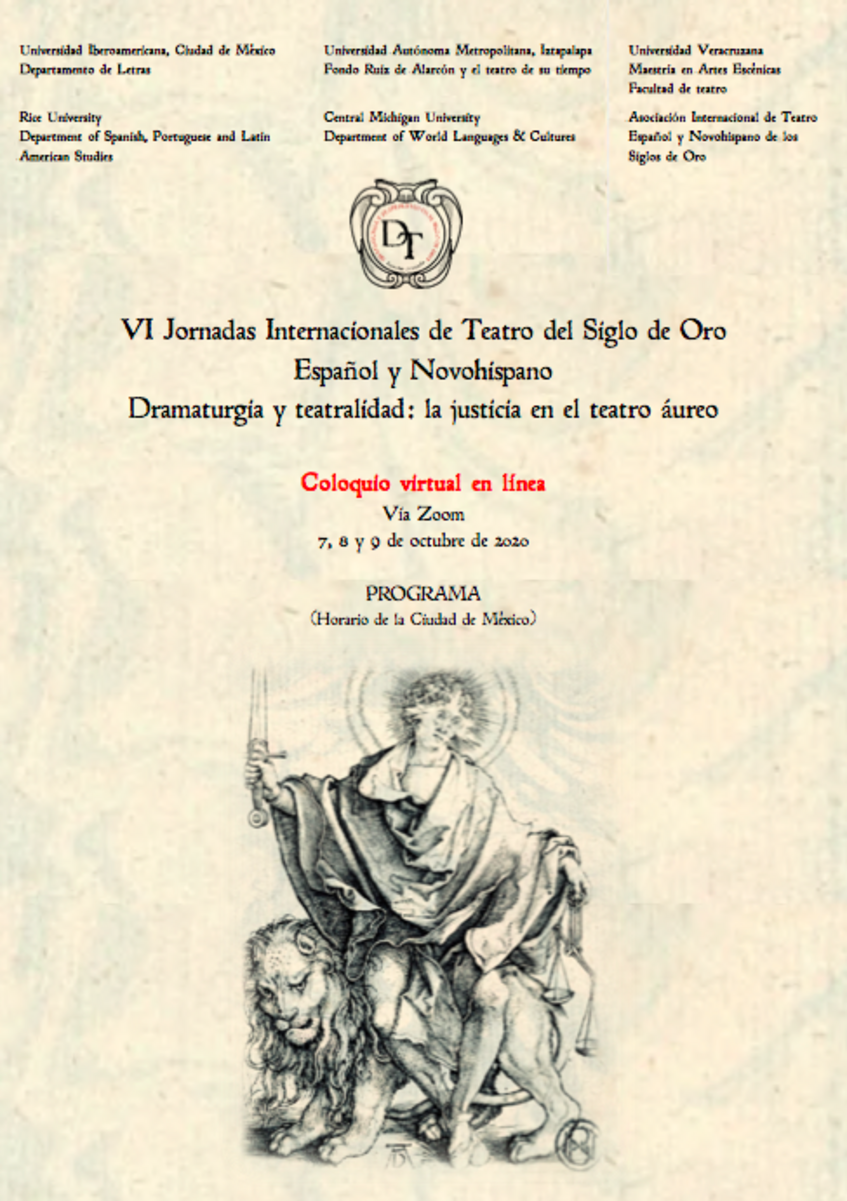
Kolloquium: Comadres – Abuelas – Vecinas. Netzwerke um Schwangerschaft, Geburt und früheste Kindheit
Wednesday, 23th September 2020
8.30-17.45
Gasthaus Hermesvilla, Lainzer Tiergarten, Vienna
The project group met at Hermesvilla to present their current state of research and have a lively discussion about the important role of the grandmother for securing the family association. Sabrina Gorhsebner had been recently invited to a delivery room to observe a caesarean section and gave us meaningful insight in the practice of obstetricians and midwives. Then the project members presented their field of investigation and their current state of research. Furthermore there haven set important decisions regarding the logo and design of the following Avisos issues have been set.
The program below gives you insight about the current research filed of our project members.
File size: 137 kB
Trip to Innsbruck
Following up on our mission of pursuing echoes of Golden Age royal Spain in Austria, on September 1th we embarked an early-bird train to beautiful Innsbruck. To begin our project excursion, we studied family networks and inner-Habsburg social dynamics admidst the Hofkirche's bronze figures and observed different particularities of kinship-links between the Austrian and Spanish Habsburgs. We then proceed to visit the Tiroler Volkskunstmuseum's exhibition Precarious Life, which puts a distinct focus on Early modern society's ritualistic handling of the, then, omipresent transience of life. In the frame of a fine-tuned tour through Schloss Ambras' portrait gallery, we then discussed the Habsburgs' marital politics, royal births, pregnancy-related customs, just as well as the life of infants at court. In this setting, personal royal stories' such as Philippine Welser's secret parturition or the adoption of her proper child as an alleged foundling were thematized. We furthermore gathered valuable impulses for the project's research within this tour: the superstitious use of Freysenketten (amulet chains) with the purpose of protecting children, the incorporation of "Holy Lengths" (ties measured in the estimated lenght of the Virgin) during birth or the application of botanical remedies like Cassia Fistula to ease complications during births at court. The teams's lively discussion was enriched by the insights of Professor Birgit Mertz-Baumgartner from Innsbruck's Romance Studies Institute.
Annual Project Meeting
On 23.07.2020 we took advantage of the beautiful weather to hold our annual project meeting at the Jägerwiese.
To create a framework for discussion many of the project members presented their field of investigation and their current state of research. Based on these presentations, exciting impulses, food for thoughts and ideas for future publications were exchanged.
To get an insight into the wide range of the lecture topics click here to download the program.
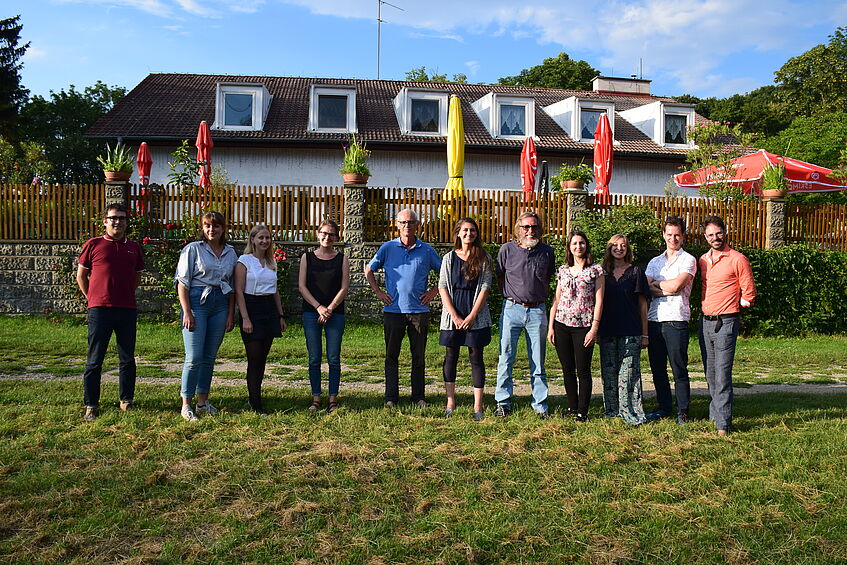
File size: 89 kB
Searching for traces in Eggenberg
On 07.07.2020 a charming slovenian dining car brought us to Graz where we explored several of the 24 state rooms in Schloss Eggenberg. Astonished we combed through the ceiling paintings for motives of ancient birth myths.
Afterwards we had an inspiring talk with our colleagues from the Departments of Classical Philology and Romance Studies Graz about early Baroque myth reception, calendar calculation and emblems.
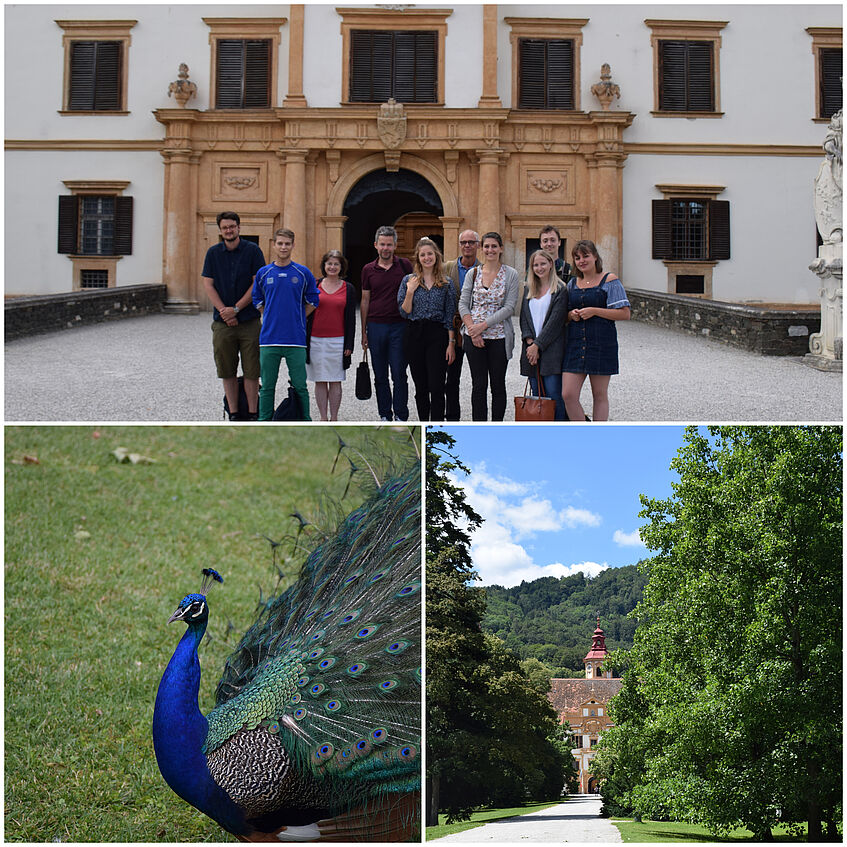
Rituales alrededor del parto en la Castilla premoderna
Wednesday, 17.06.2020
Speaker: Pilar Panero (Universidad de Valladolid)
Due to COVID-19 this lecture is going to be an online lecture.
El lenguaje de las campanas de Castilla
Tuesday, 16.06.2020, 9.15-10.45
Speakers: José Alonso Ponga (Universidad de Valladolid)
Due to COVID-19 this lecture is going to be an online lecture.
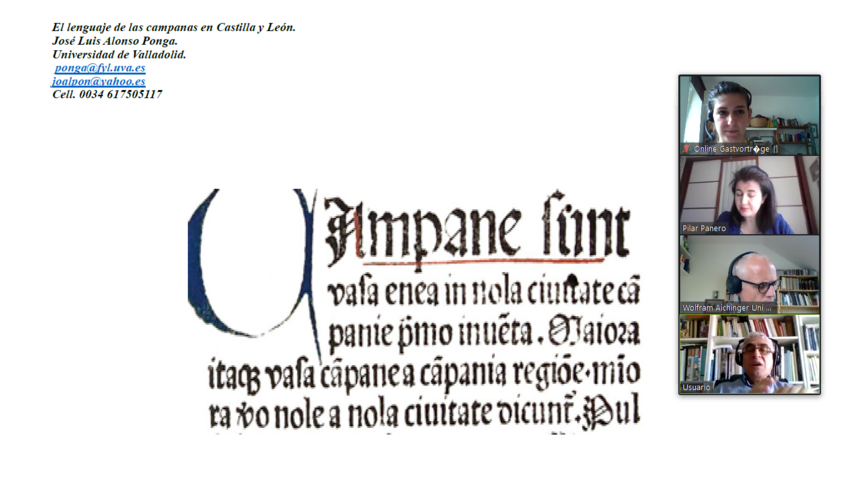
Stoffe schaffen, Leben wirken: von der oftmals unterschätzten Bedeutsamkeit weiblicher Handarbeit
Tuesday, 26.05.2020, 11:15
Speaker: Sabrina Grohsebner (University of Vienna)
Due to COVID-19 this lecture is going to be an online lecture. If you want to participate you can register under sabrina.grohsebner@univie.ac.at
Zur Kulturgeschichte der Geburt im 19. Jahrhundert
Tuesday, 20.05.2020, 11:00
Speaker: Marita Metz-Becker (University of Marburg)
Due to COVID-19 this lecture is going to be an online lecture.
Mesa redonda: Políticas de parentesco y procreación en la Guinea Ecuatorial
Tuesday, 19.05.2020, 11.15-12:45
Venue: Department of Romance Studies, University of Viena (ROM 4)
Speakers: Remei Sipi, Melibea Obono, Joaquín Mbomío
In collaboration with Max Doppelbauer
Due to COVID-19 this event had to be cancelled.
Ecology, society, disease, religion
Wednesday, 06.05.2020, 18.30
Venue: Fachbereichsbibliothek Romanistik
Speaker: Alessandra Foscati
Due to COVID-19 this lecture had to be cancelled.
Comadres, Dais, Sage-femmes: Midwives in a Historical and Transcultural Perspective
Friday, 18.10.2020 - Saturday, 19.10.2020
Venue: University of Viena, Department of Romance Studies (ROM 8 / ROM 2)
Speakers: Valerie Worth, Sucharita Sarkar, Diana Pelaz Flores, Jesús M. Usunáriz, Abraham Madroñal, Wolfram Aichinger, Hannah Fischer-Monzón
